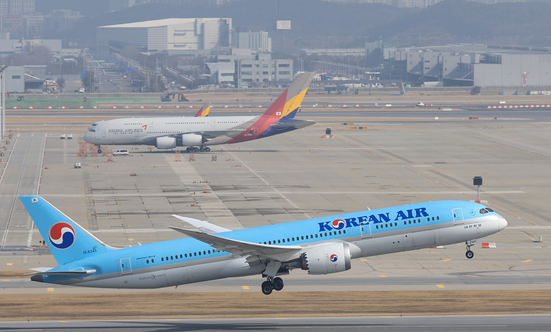
 >
>
>
>
2024.02.15
Korean Air inches closer to acquisition of Asiana with EU approval

BY SEO JI-EUN, Korea JoongAng Daily - The European Union's
conditional approval of Korean Air's proposed acquisition of Asiana Airlines
has left Korea's two largest carriers with the final step of getting the nod
from U.S. regulators.
The European Commission (EC) announced Tuesday it has
approved the proposal first announced in 2020 where Korean Air intends to buy a
63.9 percent stake in Asiana Airlines for 1.5 trillion won ($1.1 billion).
"After collecting the feedback of customers and
competitors during a market test of the proposed commitments, the Commission
concluded that the commitments preserve effective competition in cargo and
passenger transport between South Korea and the European Economic Area,"
the EC said in a statement released Tuesday evening.
"The decision is conditional upon full compliance with
these commitments," it added.
To secure approval from the EU, Korean Air's board of
directors approved the selling off of Asiana Airlines' cargo business unit and
the transfer of four overlapping European passenger routes — Frankfurt,
Barcelona, Rome, and Paris — to a domestic low-cost carrier.
The approval process in the EU has been thorough. Korean Air
submitted a formal merger notification to the EC in January 2023, and the
initial decision was anticipated by July of the same year. However, concerns
over potential monopolistic practices prompted the EC to extend the review
period twice with requests for remedial action.
T’way Air, a Korean low-cost carrier (LCC), will gradually
take over the operation of the four European passenger routes from the second
half of this year. T’way Air has already made preparations for this expansion,
including introducing three A330-300 long-haul aircraft in 2022 and plans to
operate an Incheon-Zagreb route from May.
Korean Air pledged "comprehensive support for T’way
Air," including slots and traffic rights as well as access to the required
aircraft.
According to a report from JoongAng llbo, an affiliate of
the Korea JoongAng Daily, T'way Air has outlined specific plans to operate all
four routes by the end of the year, with Paris set for June, Rome in July,
Barcelona in August, and Frankfurt in October.
Korean Air offered to divest Asiana's cargo freighter
business, including freighter aircraft, slots, traffic rights, flight crews and
other employees as well as customer cargo contracts, among others. The buyer
for Asiana Airlines' cargo business unit has yet to be identified, with Korean
Air expected to launch the bidding process soon.
The cargo business unit of Asiana Airlines is considered a
cash cow, generating annual revenue of over 1 trillion won. However, the
inheritance of debts of around 1 trillion won, on top of the sale price
estimated at around 500 billion to 700 billion won, poses a challenge.
Contenders reportedly interested in acquiring Asiana's cargo
division include budget carriers held by private equity firms, such as Eastar
Jet (owned by VIG Partners), Air Premia (owned by JC Partners), and Air Incheon
(owned by Socius) being cited among the potential buyers. While Jeju Air,
Korea's largest LCC, is also considered a potential suitor, the airline is
currently focused on operating its own recently-launched cargo business.
The proposed merger, initiated in November 2020 and now in
its fourth year, now only awaits approval from the United States among the 14
mandatory reporting countries.
Yet the U.S. Department of Justice is contemplating taking
legal action to block Korean Air's takeover of Asiana Airlines due to
competition concerns, Politico reports. The recent development that saw a
federal court sided with the department in the lawsuit concerning the merger of
U.S. airlines JetBlue and Spirit adds another layer of burden. United Airlines,
headquartered in Chicago, has also expressed opposition to the Korean
Air-Asiana merger, reportedly due to concerns that the acquisition would result
in the loss of one of its Star Alliance partners.
Resolving conflicts between management and employees, which
stem from issues like employment transfers resulting from the sale of the cargo
business unit and route redistribution, remains a challenge in the acquisition
process.
"With the EC approval secured, Korean Air continues to
be focused on its discussions with the U.S. competition authority to finalize
the overall merger review processes as soon as possible," Korean Air said.